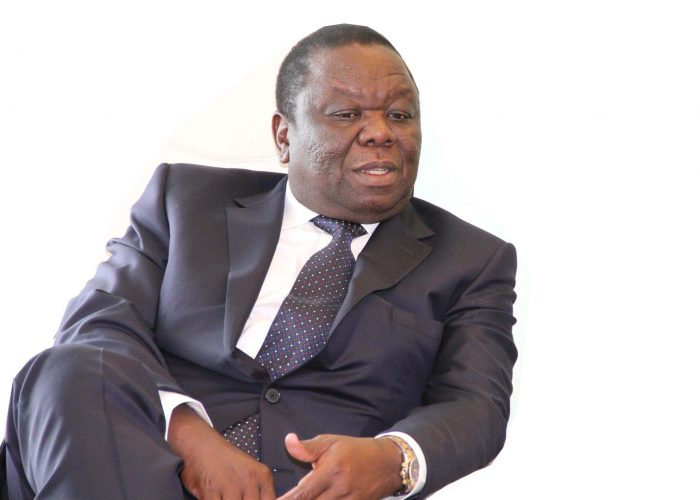


 …as electoral field gets congested
…as electoral field gets congested
A PRESIDENTIAL election run-off pitting bitter rivals President Robert Mugabe and Prime Minister (PM) Morgan Tsvangirai once again is one huge possibility that could emerge from the political setting that has evolved in recent weeks, The Financial Gazette can report.
In terms of the country’s supreme law, a run-off becomes necessary only when none of the contesting Presidential candidates has garnered 50 plus one percent of the vote.
In the March 2008 synchronised election, the Movement for Democratic Change (MDC-T) leader got 48 percent of the presidential vote ahead of the incumbent’s 43 percent but could not be declared the winner since his tally fell short of the required threshold.A run-off presidential election that followed in June of the same year was declared a sham after the MDC-T president pulled out owing to election-related violence, resulting in the ZANU-PF leader running uncontested.
To end the contestation for power that followed the inconclusive poll, the Southern African Development Community (SADC) along with the African Union had to nudge ZANU-PF and the two MDC formations to form a unity government, which expires this month.
But analysts this week said the political dynamics in Zimbabwe have metamorphosed into a complex numbers game in which none of the major political players would garner 50 plus one percent of the vote.
They said whereas the emergence of Simba Makoni’s Mavambo/Kusile/Dawn (MKD) movement a month before the March 2008 elections could have played a part in diluting the numbers for both ZANU-PF and the MDC-T, a replay of that scenario could be in the offing after Welshman Ncube’s MDC and Dumiso Dabengwa’s ZAPU agreed to work together, making them a formidable force in the coming election.
In the 2008 election, Dabengwa and Ncube’s MDC threw their weight behind Makoni. Five years on, they have struck some form of a smart partnership that leaves out Makoni, who has since thrown his lot with PM Tsvangirai.
Observers said the tie-up between Ncube and Dabengwa builds another influential bloc in Zimbabwe’s unpredictable political terrain that could eat into ZANU-PF and the MDC-T’s support base.
While the alliance is seen having little national appeal, it may chip away the MDC-T’s dominance in the three Matabeleland provinces of Bulawayo, Matabeleland North and South.
This is at a time when PM Tsvangirai is unlikely to extract any political capital from his alliance with Makoni and Reketayi Semwayo of ZANU-Ndonga whose political formations seem to have lost the momentum of the past.
With President Mugabe having successfully resisted reforms demanded by SADC and his rivals in the coalition government by employing delaying tactics, his ZANU-PF party is going into the polls under an environment that favours them.
But both ZANU-PF and the MDC-T shot themselves in the foot by dividing their supporters and officials following embarrassing primary elections held recently. The primaries were characterised by widespread imposition of candidates, vote buying and other irregularities that divided their supporters ahead of crucial elections.
Both parties are now desperate to unite their supporters and officials with only two weeks remaining before the July 31 polls. Indications are that the independent candidates that emerged in the aftermath of the emotive primary elections might also eat into their votes.
While ZANU-PF has been working round the clock to persuade its candidates to reverse their decisions to stand as independents, the MDC–T has some firefighting to do as some independent coalitions are emerging. A new grouping, the Independent Candidates Coalition (ICC) led by Redcliff parliamentary constituency aspirant, Aaron Chinhara, has since been formed.
ICC has more than 15 aspiring candidates vying for parliamentary seats and several others contesting council elections. Other members of the coalition include MDC-T’s Felix Mafa Sibanda, the outgoing Magwegwe lawmaker who is ICC’s spokesperson and Gweru mayor, Tedious Chimombe, the coalition’s organising secretary.
During the 2008 polls, the MDC–T lost six seats in the Midlands alone which it could have easily won had parallel candidates not been fielded. The coalition has, however, said they would only campaign for Tsvangirai for president.
Political analyst, Gideon Chitanga, said the failure to strike an election deal between the two MDC formations was also likely to split votes among their two coalitions, triggering a run-off since none of the parties, ZANU-PF included, was likely to garner the 50 plus one percent of the vote that would allow outright victory.
Chitaga said petty squabbling among the major parties and continued division may also cause voter apathy, especially among those people who are simply party sypathisers and not hard core supporters of any political party.
“For such people to go out to vote they need something exciting and stimulating to get them to go to vote,” he said.
Another analyst, Ricky Mukonza, also postulated that neither ZANU-PF nor the MDC-T would garner the required 50 plus one percent of the vote, making the possibility of a run-off real in the forthcoming plebiscite.
“When Simba Makoni got eight percent that denied the MDC-T outright victory in the 2008 March election, it must be noted the Makoni vote was predominantly as a result of support from the then MDC-Mutambara, now MDC-Ncube.
“The situation has not changed much, if anything, the MDC-Ncube vote might have marginally increased owing to their campaign,” said Mukonza.
“If this is true, it can be reasoned that in the event of a run- off, MDC-Ncube holds a sway vote which MDC-T will have to sweat for to get. A coalition between MDC-Ncube and ZANU-PF is unlikely. The other possibility is that of a second Government of National Unity after a first round of inconclusive results,” said Mukonza.
Despite Tsvangirai saying a pact for a grand coalition involving Ncube’s party was still possible, this week MDC spokesperson Kurauone Chihwayi scoffed at those suggestions saying the MDC-T had approached his party with dirty hands and the door on a pact had already been closed.
“The MDC-T Nicodemusly visited some of our leaders and made some silly proposals that we threw into the dustbin because it was not worth discussing.
“They approached us with dirty hands and devilish intentions for purposes of misleading Zimbabweans into believing that Tsvangirai would be the sole opposition candidate. The MDC-T had almost three years to talk to us but they chose to approach us in July 2013,” said Chihwayi.
“It is not correct that we are talking to the MDC-T, their efforts have been overtaken by events. Professor Ncube was nominated by the party’s 12 political provinces and the party will not allow him to withdraw. The coalition issue with Tsvangirai is now water under the bridge, the deal is now dead. They can have Makoni and Semwayo who do not have even dead donkeys to vote for them; We are not going to lose sleep over the so called Manicaland deal.”
After weeks of wrangling over the date of Zimbabwe’s presidential elections, the parties have finally started to campaign amid lingering concern over ghost voters, electoral reforms and how the country will finance the polls.
The July 31 election is seen as an important test of whether the country can move forward on a more stable path, and in doing so attract desperately needed investment, or whether it will return to the violence and chaos that has characterised other polls over the past decade.